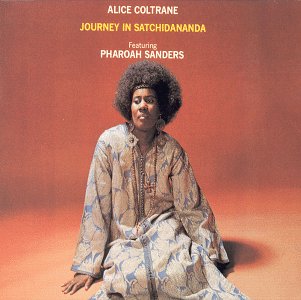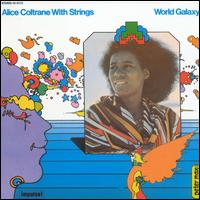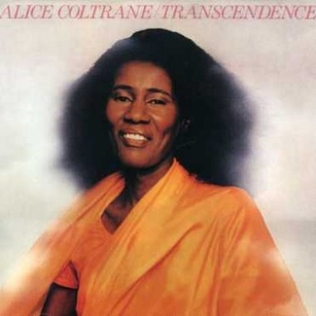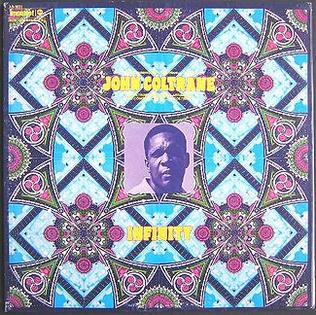
Rashied Ali, born Robert Patterson was an American free jazz and avant-garde drummer best known for playing with John Coltrane in the last years of Coltrane's life.

Alice Coltrane, also known by her adopted Sanskrit name Turiyasangitananda, was an American jazz musician and composer, and in her later years a swamini. An accomplished pianist and one of the few harpists in the history of jazz, she recorded many albums as a bandleader, beginning in the late 1960s and early 1970s for Impulse! and other record labels. She was married to jazz saxophonist and composer John Coltrane, with whom she performed in 1966–1967. One of the foremost exponents of spiritual jazz, her eclectic music proved widely influential both within and outside the world of jazz.

Ptah, the El Daoud, recorded and released in 1970, is the third solo album by Alice Coltrane. The album was recorded in the basement of her house in Dix Hills on Long Island, New York.

A Monastic Trio is the first solo album by Alice Coltrane. Recorded in 1968, she intended it to be a tribute to her husband, John Coltrane, who had died the year before. It originally featured the message: "This music is dedicated to the mystic, Ohnedaruth, known as John Coltrane during the period from September 23, 1926 to July 17, 1967."

Journey in Satchidananda is the fourth solo album by Alice Coltrane. Four of the album's tracks were recorded at the Coltrane home studios in Dix Hills, New York, in November 1970, while the remaining track was recorded live at the Village Gate in July of that year. It was released by Impulse! Records in 1971. On the album, Coltrane appears on piano and harp, and is joined by saxophonist Pharoah Sanders, bassists Cecil McBee and Charlie Haden, and drummer Rashied Ali. Vishnu Wood also appears on oud on the live track, while the studio recordings also feature Majid Shabazz on bells and tambourine and Tulsi on tanpura.

Live At The Village Vanguard Again! is a live jazz album by saxophonist John Coltrane. Recorded in May 1966 during a live performance at the Village Vanguard jazz club in New York City, the album features Coltrane playing in the free jazz style that characterized his final years. The lineup features Coltrane's quintet, with Coltrane on tenor and soprano saxophones, bass clarinet, and flute, Pharoah Sanders on tenor saxophone and flute, Alice Coltrane on piano, Jimmy Garrison on bass, and Rashied Ali on drums, supplemented by Emanuel Rahim on percussion. It was the quintet's only official recording released during Coltrane's lifetime.

Live in Japan is a live album by American saxophonist John Coltrane, recorded for radio broadcast during his only Japanese tour in July 1966 at two Tokyo venues, Shinjuku Kosei Nenkin Hall and Sankei Hall. The recordings feature his last group, a quintet featuring Coltrane, his wife/pianist Alice, saxophonist/bass clarinetist Pharoah Sanders, bassist Jimmy Garrison and drummer Rashied Ali.

Translinear Light is the final studio album by American jazz pianist Alice Coltrane, released in September, 2004 on Impulse Records. It was produced by her son Ravi Coltrane, who also played saxophone for the album as did her third son Oran. In addition to original compositions, it includes two by her husband John Coltrane and four interpretations of traditional songs.

World Galaxy is the sixth solo album by Alice Coltrane. It was recorded in November 1971 in New York City, and was released in 1972 by Impulse! Records. On the album, Coltrane appears on piano, organ, harp, tamboura, and percussion, and is joined by saxophonist Frank Lowe, bassist Reggie Workman, drummer Ben Riley, timpanist Elayne Jones, and a string ensemble led by David Sackson. Violinist Leroy Jenkins also appears on soloist on one track, and Swami Satchidananda provides narration. World Galaxy features a trilogy of original compositions bookended by "My Favorite Things" and "A Love Supreme", two pieces for which her husband John Coltrane was known. It was the second in a series of three albums on which Coltrane appeared with an ensemble of strings.

Eternity is an album by Alice Coltrane. It was recorded in August through October, 1975, and was released in 1976 by Warner Records, her first release with the label. On the album, Coltrane is joined by ensembles of varying size. It was Coltrane's first album following both her move to California and her decision to become a monastic.

Transcendence is an album by Alice Coltrane, recorded in California in May 1977, and released later that year by Sepia Tone Records. On the album, Coltrane is heard in a variety of instrumental combinations. "Vrindavana" is a solo track, while on "Radhe-Shyam" and "Transcendence", Coltrane appears on harp accompanied by a string ensemble. The remaining tracks are among the earliest examples of her use of Hindu devotional hymns called bhajans, and feature Coltrane on keyboards joined by large groups of singers who also clap and play hand instruments.

Infinity is an album credited to John Coltrane, released on Impulse! Records in 1972. It features overdubs with strings of Coltrane's pieces recorded in 1965 and 1966, at the hands of Alice Coltrane. Her controversial "re-imagining" of her husband's late works was criticised by both fans and critics, as she took his original performances and superimposed them over lush orchestral backgrounds and re-dubbed rhythm section parts, as well as recording new solos on piano, organ, harp and timpani.

Cosmic Music is a jazz album by John Coltrane and Alice Coltrane released after John Coltrane's death. John Coltrane only plays on two tracks, "Manifestation" and "Reverend King".
Blending Times is Ravi Coltrane's fifth album as a band leader, and second for Savoy Records.

Izipho Zam is the third album led by saxophonist Pharoah Sanders recorded in 1969 but not released on the Strata-East label until 1973. It features Sanders with a large ensemble.

New Thing! is a 2005 compilation album of jazz music released by Soul Jazz Records. The album compiles jazz music following social and musical changes in the jazz scene predominantly in the 1970s with artists ranging from Alice Coltrane, Sun Ra and Archie Shepp. Despite its title, the music is not specifically related to a specific group of free jazz musicians sometimes coined as the "new thing". On its release, the album received praise from publications such as AllMusic, Exclaim! and the JazzTimes.

Spiritual jazz is a sub-genre of jazz that originated in the United States during the 1960s. The genre is hard to characterize musically but draws from free, avant-garde and modal jazz and thematically focuses on transcendence and spirituality. John Coltrane's 1965 album A Love Supreme is considered landmark in the genre.

Wisdom Through Music is an album by saxophonist Pharoah Sanders. It was recorded in New York City and Los Angeles, California, and was released in 1973 by Impulse! Records. On the album, Sanders is joined by flutist James Branch, pianist Joe Bonner, bassist Cecil McBee, drummer Norman Connors, and percussionists Badal Roy, James Mtume, and Lawrence Killian. The recording was produced by Lee Young, the younger brother of saxophonist Lester Young.

Radha-Krsna Nama Sankirtana is an album by Alice Coltrane. It was recorded in California in August 1976, and was released in 1977 by Warner Bros. On the album, Coltrane is joined by students from the Vedantic Center, who sing, clap, and play hand percussion, and by her daughter Sita Michelle Coltrane and son Arjuna John Coltrane Jr.

Lord of Lords is an album by Alice Coltrane. It was recorded in California in July 1972, and was issued later that year by Impulse! Records, her final release for the label. On the album, Coltrane appears on piano, organ, harp, timpani, and percussion, and is joined by bassist Charlie Haden, drummer Ben Riley, and a string ensemble, which she conducts. Lord of Lords features three original compositions along with excerpts from Igor Stravinsky's The Firebird and an arrangement of the traditional piece "Going Home". It was the third in a series of three albums on which Coltrane appeared with an ensemble of strings.


















